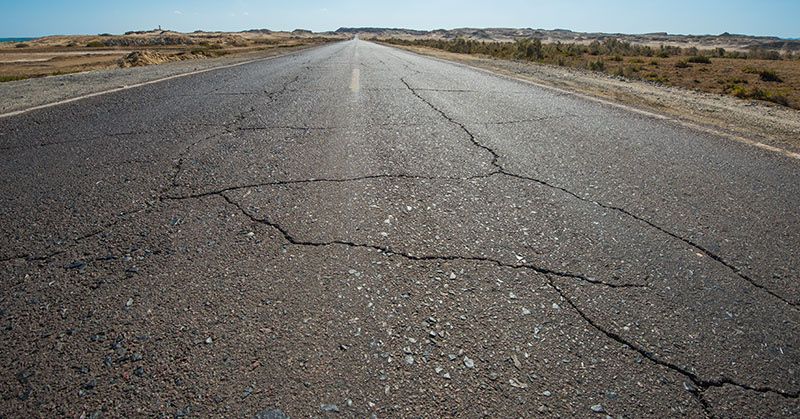
- Cracking – One of most common indications that your asphalt surface has been exposed to hot weather is cracking. Although cracks are more common in older pavement, newer surfaces can also form cracks. This is particularly true if the asphalt has to withstand heavy traffic on a regular basis and is exposed to prolonged periods of high ambient temperatures.
- Tracking – When it’s extremely hot outside, asphalt can show signs of what’s called “tracking.” This happens when the pavement softens and small amounts of asphalt begin to stick to tires, shoes, or anything else that walks or rolls across the surface.
- Raveling – Excessive heat can also cause asphalt to disintegrate. If you notice areas in your pavement where gravel and crushed stone are starting to accumulate, it’s typically due to the aggregate and binder in the asphalt separating – something that can be caused by extremely hot weather.
- Oxidation – When asphalt pavement is exposed to long periods of heat and bright sunshine, it can become faded and brittle. This is because UV rays weaken the binder material in the asphalt mixture. Oxidation not only makes the surface faded and brittle – it can also lead to cracking and raveling.
Excessive heat is not the only climate condition that can damage an asphalt surface. Rain and the freeze/thaw cycle that occurs in many northern states can also compromise pavement. Fortunately, there are steps you can take to protect your paved surfaces. Have any kind of minor damage repaired as quickly and possible, and have the pavement seal coated on a regular basis to guard against damage caused by virtually any kind of weather, including excessive heat.
For more information about how to protect your paved surfaces from the extremes of Mother Nature, contact a local, reputable paving contractor today and schedule an appointment.